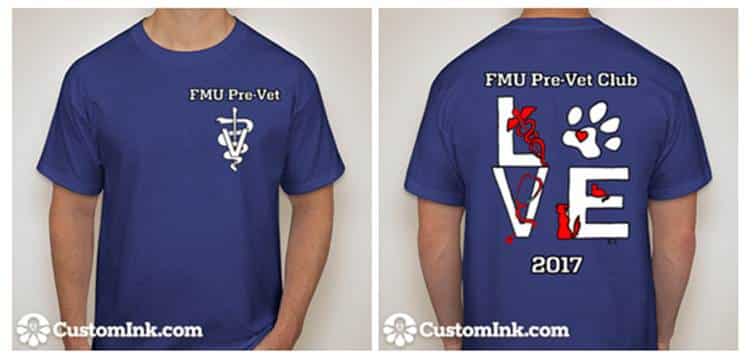Biology Major,
Veterinary Studies Option
Department of Biology
Helping animals live better lives
Coordinator: Dr. Tamatha Barbeau
The Veterinary Studies Option prepares biology students for paraprofessional careers involving the health, well-being, or management of animals. It also prepares students for entry into various professional-level veterinary medicine and veterinary sciences post-graduate programs. Potential career outcomes vary widely and may include veterinary medicine, veterinary support, animal care and support in biomedical and diagnostic research setting, population management of animals, zookeeping careers, and positions with non-profit animal rescue/relocation/rehabilitation organizations. The Veterinary Studies option requires the completion of 120 total credit hours, including the General Education courses and core science classes related to animals and veterinary studies.
Applying to Veterinary School
The Veterinary Studies Option can also meet the admission requirements of most Veterinary Schools. Students who plan to pursue Veterinary School should research the individual requirements of the programs to which they intend to apply. Every school has its own course requirements, and students need to be aware of of these as they register for upper-level courses and electives. For more information on school-specific coursework requirements, and links to accredited veterinary schools, please see Dr. Barbeau’s Pre-Vet Advising page.
At the minimum, students applying to Veterinary School should do the following:
- Take Microbiology (BIOL 311) to fulfill the Organismal Block.
- Take Genetics (BIOL 401) to fulfill the Genetics Block.
- Take Principles in Animal Nutrition (BIOL 217), Comparative Vertebrate Anatomy (BIOL 305), and Animal Physiology (BIOL 410) to fulfill the biology electives.
- Complete a Chemistry Minor including Organic Chemistry 2 (CHEM 202) and Biochemistry (CHEM 404)
General Education Requirements
Communications (9 hours)
- ENGL 101: Analysis & Argument (3)
- ENGL 102: Rhetoric Genre Research (3)
- SPCO 101: Basics of Oral Communication (3)
Social Sciences (9 hours)
- POLI 101: U.S. Government or POLI 103: Introduction to Political Science (3)
- Two elective courses in Anthropology (ANTH), Economics (ECON), Geography (GEOG), Political Science (POLI), or Sociology (SOCI). (3)
- Honors (HNRS) courses 250-259 will also fulfill this requirement.
Humanities (12 hours)
- Literature (ENGL) (3)
- History (HIST) (3)
- Fine Art Appreciation (ART 101, MUSI 101, or THEA 101) (3)
- One elective course in Art (ART), Literature (ENGL), History (HIST), Music (MUSI), Theater (THEA), or Philosophy & Religious Studies (PRS) or AAAS 200: Introduction to African American Studies or GNDR 200: Gender Studies (3)
- Honors (HNRS) courses 260-269 will also fulfill this requirement.
Mathematics (6 hours)
- A minimum of 6 hours of mathematics courses MATH 111 or higher.
Natural Sciences (12 hours)
- A minimum of 12 hours of science courses with laboratories.
- Veterinary Studies majors fulfill this General Education requirement automatically.
- Biology (BIOL) or Environmental Science (ENVR) (4)
- Chemistry (CHEM), Physics (PHYS), or Physical Science (PSCI) (4)
- Astronomy (ASTR), Biology (BIOL), Chemistry (CHEM), Environmental Science (ENVR), Physics (PHYS), Physical Science (PSCI), Psychology (PSYC 206/216) (4)
- Honors (HNRS) courses 280-289 will also fulfill this requirement.
Major Requirements
Biology (36 hours)
- One course from Introductory Group I: (4)
- One course from Introductory Group II: (4)
- One course from the Cellular and Molecular Biology Block: (4)
- One course from the Organismal Diversity Biology Block: (4)
- Ecology Block: (4)
- BIOL 412: Animal Behavior
- One course in the Genetics and Evolution Block: (4)
- Three additional (BIOL) courses are needed to bring the total biology credits to 36 hours.
- Courses must be 200-level or above.
- The BIOL 490: Veterinary Studies Internship course does not fulfill the biology elective requirements for the Veterinary Studies major.
- BIOL 499: Biology Capstone Seminar (1)
Veterinary Studies Internship (1-3 hours)
- BIOL 490: Veterinary Studies Internship (1-3)
- Please speak to the pre-veterinary coordinator for information about applying for this internship.
Chemistry (12 hours)
- CHEM 111/111L: General Chemistry I (4)
- CHEM 112/112L: General Chemistry II (4)
- CHEM 201: Organic Chemistry I
Physics (8 hours)
OR
Statistics (3 hours)
- Choose one from the following:
- MATH 134: Probability and Statistics (3)
- BIOL 413: Biostatistics and Research Methods (3)
- If a student takes MATH 134, they will fulfill the second math for general education. If they take BIOL 413 for the statistics requirement, they will need to take a second mathematics course for general education.
Minor/Collateral Requirements
FMU students are required to complete either a minor or two collaterals in addition to their major for graduation.
- A minor in another discipline requires at least 18 hours of coursework in that discipline.
- Some restrictions may apply, please check minor requirements for other disciplines.
- Many Veterinary Studies students choose to take 2 more chemistry courses to complete the Chemistry Minor.
- Collaterals in other disciplines require 12 hours of coursework in those disciplines.
- Some restrictions may apply, please check collateral requirements in other disciplines.
- Veterinary Studies students earn a Chemistry Collateral automatically when they complete the major requirements.
Additional Information
- Additional elective courses in any discipline may be needed to reach the total 120 hours required for graduation.
- When choosing electives, students should remember that certain career paths may seek knowledge that are not strictly required for the biology major.
- Examples: technical writing, computer science, GIS skills, etc.
- When choosing electives, students should remember that certain career paths may seek knowledge that are not strictly required for the biology major.
- To advance to a higher biology course, a student must earn a grade of C or higher in each prerequisite biology course.
Pre-Veterinary Club
There is also a Pre-Veterinary Club at Francis Marion University, which provides an outlet for meeting other students. The club is active in campus events, as well as in community events, which benefit animals or organizations that are devoted to animal welfare. For additional information please contact the Pre-Veterinary Coordinator.
